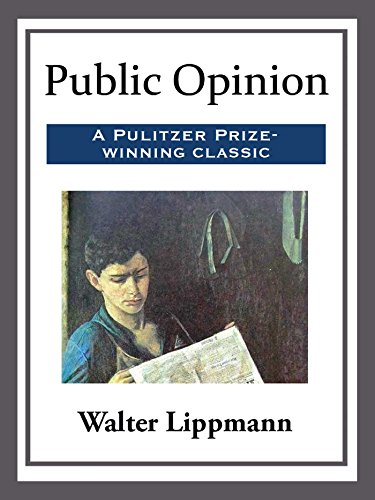Public Opinion
Walter Lippmann
BOOK REVIEW

In the intricate dance between media and democracy, Walter Lippmann's Public Opinion emerges as a seminal work that demands your attention. Written in a time when the very fabric of public discourse was being stretched by the burgeoning influence of mass communication, this book is not merely relevant; it's a compelling mirror reflecting our own media-saturated reality. As you delve into its pages, you'll find yourself grappling with questions that shape our society: How does public opinion form? Who controls the narrative? And why does that matter?
Lippmann, a towering figure in American journalism and the political landscape of the early 20th century, distills complex theories of perception and reality into a fascinating exploration of the relationship between the media, the individual, and the collective psyche. He argues provocatively that what we often perceive as "reality" is, in fact, a series of constructed images shaped by powerful elite forces. He unveils the uncomfortable truth: most citizens lack direct knowledge of the world and rely instead on second-hand portrayals, leading to a manufactured consensus. This notion feels painfully familiar as we scroll through social media feeds that bombard us with curated slices of life and opinion, doesn't it?
Readers have remarked upon the book's piercing relevance, and critiques abound. Some laud Lippmann's insight into the illusory nature of public opinion as a bold declaration of the media's sway over the masses. Others argue that Lippmann's skepticism veers into cynicism, suggesting that ordinary citizens are inherently incapable of forming rational opinions. This duality-admired brilliance versus daunting condescension-fuels discussion and controversy, reflecting the polarized nature of our public discourse today. Many find solace in Lippmann's observations as prescient warnings against complacency in an age where misinformation thrives, while others reject his view as defeatist, an affront to democracy itself.
Transporting you back to a post-World War I America, Lippmann's exploration arises when society was in tumult. The cataclysmic effects of the Great War reshaped ideologies, and the rapid spread of information technology added a new dimension to public engagement. Lippmann's insights allowed us to question who truly influences the public sphere and how those influences reflect our deepest fears and desires. As he writes, "The world that we have made as a result of the level of thinking we have done thus far creates problems that we cannot solve at the same level of thinking." Herein lies a transcendent call to arms for critical engagement, urging you to step away from passive consumption and act as a sentinel of truth.
As you immerse yourself in this text, feel the urgency reverberating through Lippmann's words. It's not merely about historical context but rather a reminder of the responsibility that accompanies citizenship. In today's age of viral misinformation, Lippmann's analysis cuts sharper than ever. His admonitions about the dangers of an uninformed public resonate as we navigate a digital landscape rife with echo chambers and sensationalism. You can almost feel the pulse of history thundering in your ears, echoing the cries of those who came before, grappling with the same existential questions about truth, narrative, and the public's role within it.
Critics from various corners of academia and journalism dissect Lippmann's arguments, surface-level as they often tread, compelled to either celebrate or combat the implications of his theories. His influence cannot be understated; many who followed, including scholars, journalists, and political theorists, have drawn upon his work to confront the unfolding complexities of their own times. Authors and thinkers like Noam Chomsky and Edward Herman have taken cues from Lippmann, examining the interplay of media and power structures in modern democracies.
Embrace the challenge that Public Opinion presents. It's not just a historical artifact; it's a clarion call that urges an awakening. Lippmann's incisive observations not only stimulate thought but demand that you engage and reflect upon your perceptions of reality. Are you a passive observer or an active participant? Your identity as a consumer of information shapes the world around you, and each interaction with news and media molds the very perception of truth itself.
This is your invitation to pick up a book that transcends time-a relentless spirit, echoing across the decades, charging you to question, analyze, and react. Can you afford to stand on the sidelines while the narratives unfold? Public Opinion isn't just about the past; it's a roadmap through the murky waters of contemporary discourse. Don't miss out on the opportunity to reshape your understanding of the world! 🧐✨️
📖 Public Opinion
✍ by Walter Lippmann
🧾 162 pages
2015
#public #opinion #walter #lippmann #WalterLippmann